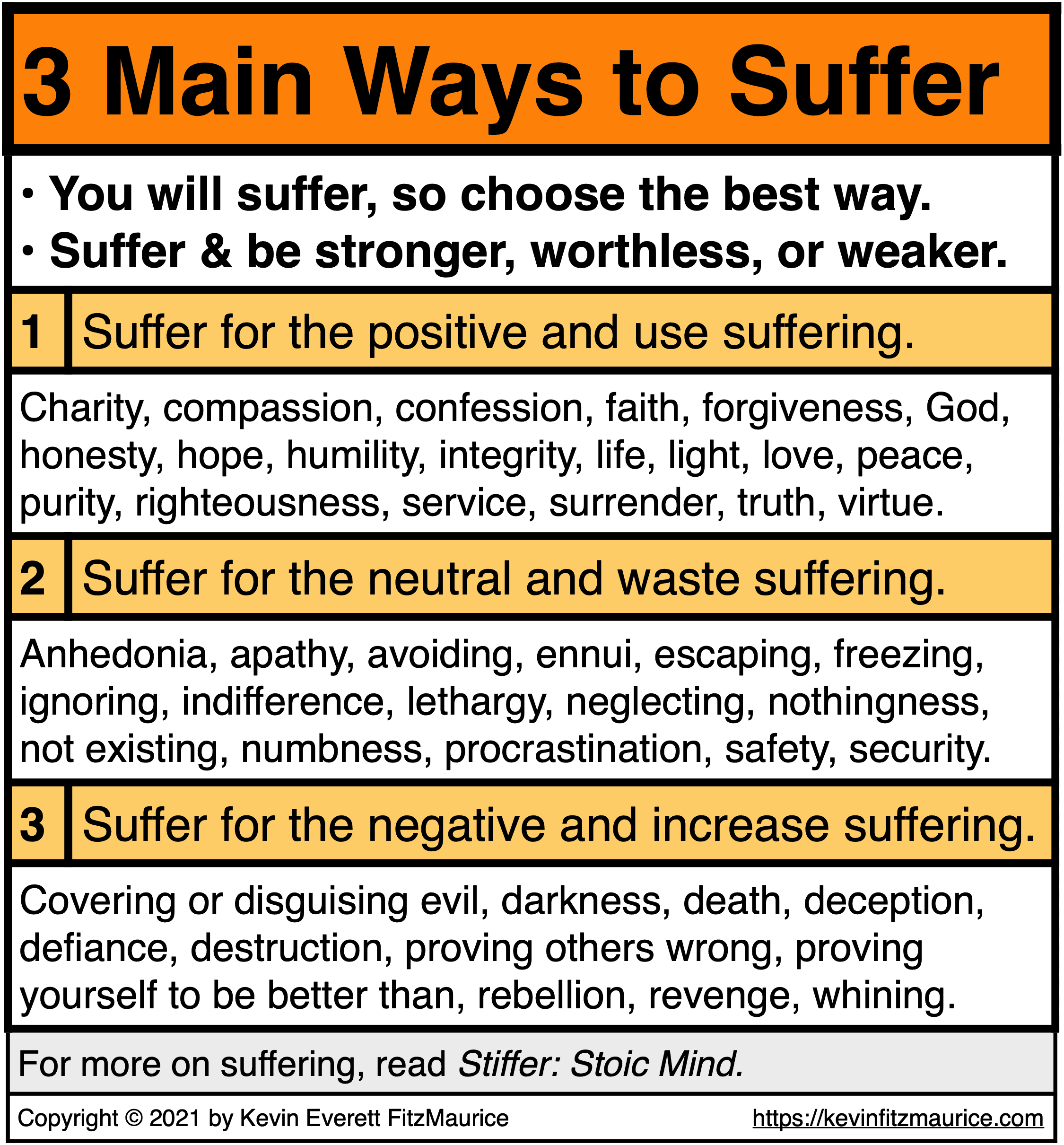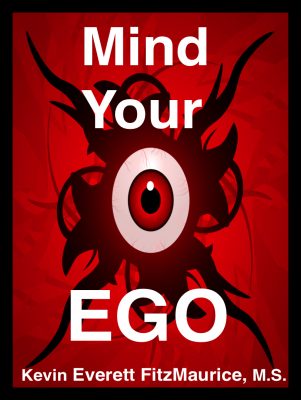Suffering Defined & Explained with Examples
- Ego will help you to recognize, remove, and replace your ego: a.k.a. self-esteem.
“Buddha said that life is suffering. However, life is not suffering; ego is suffering.” —Kevin Everett FitzMaurice
“Once you label me, you negate me.” —Søren Kierkegaard
“Peace begins when expectation ends.” —Sri Chinmoy
“Suffering is not the opposite of happiness; it is the veiling of happiness. It is a call from happiness itself, reminding us that we have mistaken our Self for an idea, an image or an object.” —Rupert Spira
- Read for the best understanding of the meaning and purpose of life.
5 Answers to “What is suffering?”
- Click for quotations on coping and suffering.
What Is Suffering?
- Conflict is a way to understand suffering.
- Living a lie is a way to understand suffering.
- Negative stress is a way to understand suffering.
- Living in delusion is a way to understand suffering.
- Living in darkness is a way to understand suffering.
- The friction between opposite forces or points of view is a way to understand suffering.
What Is the Opposite of Suffering?
- Peace is the opposite of suffering.
- Serenity is the opposite of suffering.
- Nondoing is the opposite of suffering.
- Tranquility is the opposite of suffering.
- Acceptance is the opposite of suffering.
- Faith in God is the opposite of suffering.
- A quiet mind is the opposite of suffering.
- Non-knowing is the opposite of suffering.
- Rest or returning is the opposite of suffering.
- A still and calm mind is the opposite of suffering.
- Turning everything over to God is the opposite of suffering.
- Read for the best understanding of the meaning and purpose of life.
Why Is Self-Esteem Suffering?
- Self-esteem is suffering because conditional self-esteem is a delusion.
- Self-esteem is suffering because of the conflict between positive and negative self-esteem.
- Self-esteem is suffering because self-esteem is always changing and never at peace or rest.
- Self-esteem is suffering because self-esteem offers no solution or end to its self-created problem of changing self-ratings.
- Self-esteem is suffering because it creates negative stress about who and what you were, are, and are supposedly becoming.
- Self-esteem is suffering because self-esteem cannot offer any guarantees or safety from the ever-present conflict between positive and negative self-concepts and self-images.
Why Are Self-Stories Suffering?
- Self-stories are about the dance of pride and shame, and this perpetual battle is suffering.
- Self-stories are lies because they are based on you as things and thoughts and you are neither.
- Self-stories never arrive at the end of the story and continually provide both positive and negative self-esteem experiences.
- Self-stories are delusions that keep you away from and out life by keeping you lost in your fantasies about who you were, who you are, and who you will become.
- Self-stories are inherently stressful because they are difficult to control, direct, and script due to their being easily altered by any new input from others or experiences.
Why Is Viewing Life As Being About You Suffering?
- To believe life is about you is to live a lie.
- To believe life is about you is to live in darkness and delusion.
- You are not the center of life and to think you are puts you in conflict with life.
- To believe life is about you is to believe that life is changing who and what you are which is a delusion.
- You are not the center of life and to think you are puts you in conflict with others who think they are the center of life.
- To believe life is about you is to live in negative stress because you cannot control life to be about you the way you think life should be about you.
Why Are Self-Talk Games Suffering?
- Self-talk is about conflict, or there is no self-talk.
- Self-talk is about using darkness to hide conflicts.
- Self-talk is self-centered and narcissistic delusions and lies.
- Self-talk is negative stress because self-talk cannot control how you appear to others.
- Self-talk is about practicing lying to yourself about who and what you were, are, and will be.
Why Is Ego and the Dance of Pride and Shame Suffering?
- To identify with ego instead of self is suffering the loss of self.
- To identify with pride or shame instead of self is suffering the loss of self.
- Ego is a lie because ego is not your authentic or natural self.
- Ego cannot escape the dance of the opposites because ego is based on that dance/battle.
- Ego is a delusion because the way life is perceived through the screen of ego is always false to facts.
- Ego exists in perpetual conflict between the opposites of positive and negative self-esteem concepts and images.
- Ego is negative stress because despite suppressing unfavorable opinions of self into darkness, the conflict remains.
- Read for the best understanding of the meaning and purpose of life.
Physical & Psychological Suffering
- Physical suffering is not the same as psychological suffering.
- Physical and psychological suffering often interact.
- Physical and psychological suffering can feed each other.
- Physical and psychological suffering can cause each other.
- Physical and psychological suffering can excuse and protect each other.
- Physical and psychological suffering can share the same ego payoffs, hidden agendas, and rewards such as gaining attention.
- Physical suffering can be used to help overcome psychological suffering because learning to overcome any suffering can be used to overcome another kind of suffering.
- Read for the best understanding of the meaning and purpose of life.
Expectations As the Cause of Suffering
“Expectation is the root of all heartache.” —Willian Shakespeare
“Desire is the root of all suffering.” —Second Noble Truth of Buddhism
“Discontent springs from a constant endeavor to increase the amount of our claims, when we are powerless to increase the amount which will satisfy them.” —Arthur Schopenhauer, The Wisdom of Life
“Hope deferred maketh the heart sick: but when the desire cometh, it is a tree of life.” —Proverbs 13:12
“Needing leads to bleeding—to almost all inevitable suffering.” —Albert Ellis, Buddhism and Rational Emotive Behavior Therapy
- REBT views demands as the cause of suffering.
- REBT focuses on four main issues: low frustration tolerance, self-and-other ratings, awfulizing, demands.
- Low frustration tolerance (LFT) demands an end to frustration or is a demand to get what you want. Ratings of self and others demand that you appear higher and not lower (superior to others a.k.a. high self-esteem). Awfulizing demands that you are protected, rescued, or have it easy.
- Demands can all be reduced to expectations. Shoulds and musts are about expecting something either to happen or not to happen. The stronger the expectation, the stronger the demand for the expectation to become or control reality.
- Buddhism views desire as the cause of suffering.
- Desires can all be reduced to expectations. Without expectations, there can be no desires. Either explicitly or implicitly every desire expects something.
- It would be unwise to get rid of all expectations, desires, and demands because one is often required to care for or protect others. What is wise is to understand what expectations, desires, and demands are causing you unnecessary conflicts, difficulties, and negative stress.
“Buddha said that life is suffering. However, life is not suffering; ego is suffering.” —Kevin Everett FitzMaurice
“Buddhism teaches that desire is the cause of suffering. However, desire is not the cause; expectations are the cause of suffering.” —Kevin Everett FitzMaurice
- Read for the best understanding of the meaning and purpose of life.
3 Ways to Suffer with 3 Results
- Learn how to use suffering.
- Learn how to stop misusing suffering.
3 Main Ways to Suffer
- Read for the best understanding of the meaning and purpose of life.
3D: Daily Dose: 2020
#Demands #Expectations: 2020-03-05
“Hope and pray for the best, but expect and plan for the worst.”
- To better manage expectations, first separate your dreams and goals from your expectations.
- Low expectations lead to gratitude and happiness, and high expectations lead to frustrations and irrational demands.
- Thinking things are likely to fail defeats high expectations and protects dreams and goals from discouragement.
- Expecting failure, and so problem-solving in advance (proactive measures), is more useful than expecting success because predicting failure helps you to overcome the inevitable setbacks that life often has in abundance.
- A continued attitude of low expectations can make for a productive and satisfying life instead of a life of regret and whining about conditions that come from maintaining high expectations.
#Expectation #Unhappiness: 2020-03-06
“Hope and pray for the best, but expect and plan for the worst.”
- Expectations are at the root of anxiety, worry, and fear.
- Expectations are at the root of guilt, shame, and depression.
- Expectations are at the root of whining, blaming, and damning.
- Expectations are at the root of discontent, dissatisfaction, frustration, and unhappiness.
- Expectations are at the root of the irrational demands focused on in Rational Emotive Behavior Therapy (REBT).
#Gratitude #Expectations: 2020-03-10
“Hope and pray for the best, but expect and plan for the worst.”
- Expectations are the enemy of gratitude because you are not grateful for what you expect to get anyway.
- Expectations are the enemy of serenity because you are not serene when things don’t turn out the way that you expect.
- Expectations are the enemy of peace of mind because your mind is not peaceful when it does not get what it expects to get.
- Expectations are the enemy of appreciation and thankfulness because you do not appreciate what you expect to get as a matter of course.
- Expectations are the enemy of contentment because you will not be content with what happens unless it meets or exceeds your expectations.
#Desire #Expectation: 2020-03-22
- Desire expects something that does not exist, or the desire does not exist.
- Desire is painful because desire has a projected image in mind of what it wants and a reality in front of it that does not yet contain that projection.
- Desire is painful because desire has a projected image in mind of what it wants, and often reality will not comply with desire causing a clash between the mind’s projection and what is eventually served up.
- Desire is easily understood as a form of expectation because desire projects something into the future that does not fit current reality, and that also often fails to meet future reality.
- Desire is easily understood as a form of a demand, whether a mild demand that something should happen (I hope I get the job) or a strong demand that something must happen (a baby crying to be fed).
#Expectations #Peace: 2020-04-20
- Expectations do not allow for clean or original experience because expectations color experience.
- Expectations do not allow for peace and serenity because expectations are desires and demands for what should be.
- Expectations do not allow for freedom of discovery, exploration, and inquiry because expectations are focused on harvesting specific territories.
- Expectations do not allow for spontaneity and joy because expectations are agenda-based, and that does not allow for the freedom that spontaneity and joy require.
- Expectations do not allow for acceptance, coping, forgiveness, and understanding because expectations have goals that must be met, and anything that thwarts those goals is the enemy or at least a nuisance.
#Expectation #Desire: 2020-08-25
- Expectations cause disturbance when you desire expected outcomes.
- Expectations cause disturbance when you demand expected outcomes.
- Expectations cause disturbance when you identify with expected outcomes.
- Expectations cause disturbance when you fear or resist expected outcomes.
- Expectations cause disturbance when you have an investment in or pride riding on expected outcomes.
- Read for the best understanding of the meaning and purpose of life.
Related Pages Alphabetically Listed
- Coping Skills: Free Help
- Counseling Issues: Free Help
- Desire: Attachment to Desire Problem, Not Desire
- Emotional Responsibility: List Pages
- Pray for Right Suffering: “Untitled” by John Newton
- Quotations: Coping with Difficulties
- Quotations: Expectations & Suffering
- Quotations: Work Is Wonderful
- Suffer Well Since You Will Suffer
- Suffering: The Cause of
- Read for a system to take charge of your self-talk.
- Read and master the life skill of acceptance using the best combination of CBT, REBT, & Stoicism.
- Read for the best understanding of the meaning and purpose of life.
6 Groups of Topics Menu
- 1. Pages by Topic
- 2. Fast-Facts by Topic
- 3. Quotations by Topic
- 4. Poems by Topic
- 5. Scripture by Topic
- 6. Websites by Topic
- Read and master the life skill of acceptance using the best combination of CBT, REBT, & Stoicism.
- Read for the best understanding of the meaning and purpose of life.
9 Skills & Topics Menu
- 1. Anger Skills & Topics
- 2. Blame Skills & Topics
- 3. Communication Skills & Topics
- 4. Coping Skills & Topics
- 5. Counseling Skills & Topics
- 6. Praying Skills & Topics
- 7. Recovery Skills & Topics
- 8. Responsibility Skills & Topics
- 9. Thinking Skills & Topics
- Read and master the life skill of acceptance using the best combination of CBT, REBT, & Stoicism.
- Read for the best understanding of the meaning and purpose of life.





